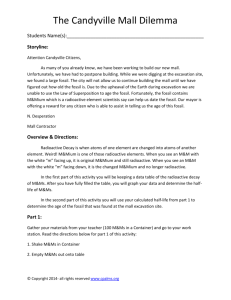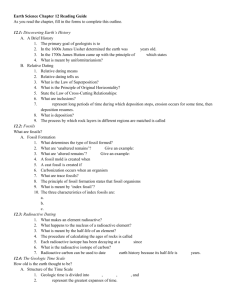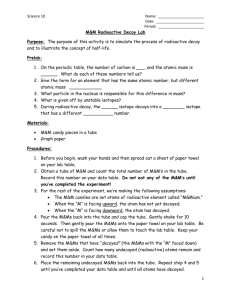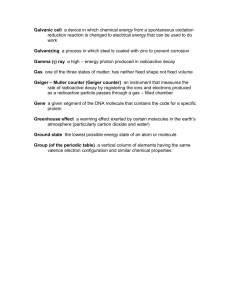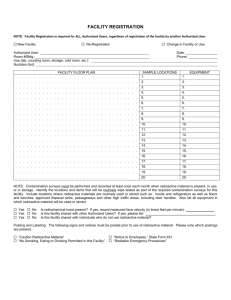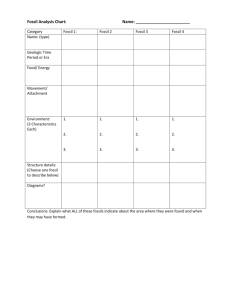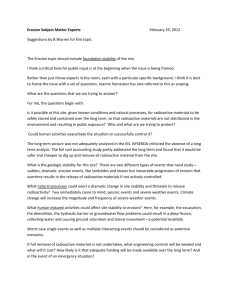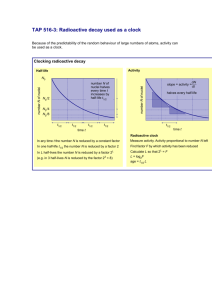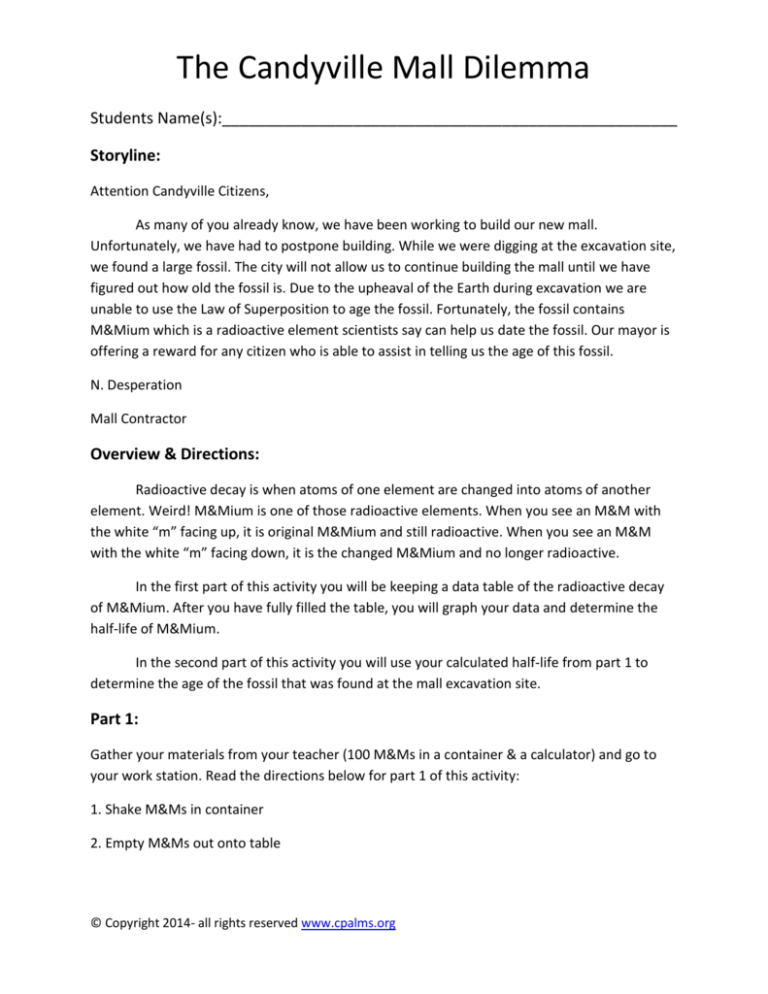
The Candyville Mall Dilemma
Students Name(s):____________________________________________________
Storyline:
Attention Candyville Citizens,
As many of you already know, we have been working to build our new mall.
Unfortunately, we have had to postpone building. While we were digging at the excavation site,
we found a large fossil. The city will not allow us to continue building the mall until we have
figured out how old the fossil is. Due to the upheaval of the Earth during excavation we are
unable to use the Law of Superposition to age the fossil. Fortunately, the fossil contains
M&Mium which is a radioactive element scientists say can help us date the fossil. Our mayor is
offering a reward for any citizen who is able to assist in telling us the age of this fossil.
N. Desperation
Mall Contractor
Overview & Directions:
Radioactive decay is when atoms of one element are changed into atoms of another
element. Weird! M&Mium is one of those radioactive elements. When you see an M&M with
the white “m” facing up, it is original M&Mium and still radioactive. When you see an M&M
with the white “m” facing down, it is the changed M&Mium and no longer radioactive.
In the first part of this activity you will be keeping a data table of the radioactive decay
of M&Mium. After you have fully filled the table, you will graph your data and determine the
half-life of M&Mium.
In the second part of this activity you will use your calculated half-life from part 1 to
determine the age of the fossil that was found at the mall excavation site.
Part 1:
Gather your materials from your teacher (100 M&Ms in a container & a calculator) and go to
your work station. Read the directions below for part 1 of this activity:
1. Shake M&Ms in container
2. Empty M&Ms out onto table
© Copyright 2014- all rights reserved www.cpalms.org
The Candyville Mall Dilemma
Students Name(s):____________________________________________________
3. Separate M&Ms with “m” facing up (Radioactive M&Mium) from M&Ms with “m” down
(Changed M&Mium).
Changed M&Mium
Radioactive M&Mium
4. Record the number of radioactive M&Mium in the data table below.
5. Set aside the changed M&Mium (“m” down). Return the radioactive M&Mium(“m” up) to the
container and repeat directions 1-5 until no radioactive M&Mium remain.
Data Table:
Times Emptied on the
Table (Each time is
representative of 1 Million
Years)
0
1
2
3
4
5
6
7
8
9
10
# of Radioactive M&Mium Remaining
(M&Ms with “m” showing)
100
58
26
18
10
7
3
1
0
© Copyright 2014- all rights reserved www.cpalms.org
The Candyville Mall Dilemma
Students Name(s):____________________________________________________
Use your data table from the previous page to create a graph below.
% of Radioactive M&Mium Remaining
Radioactive Decay of M&Mium
100
90
80
70
60
50
40
30
20
10
0
0
2
4
6
Time (Millions of Years)
8
10
Post-Lab Questions:
Part 1- Graph Analysis
1. The term half-life means the amount of time that has to pass in order for half of your
radioactive material to be changed. Look at your graph and determine how many millions of
years had to pass for you to go from your original 100 M&Mium to 50 M&Mium remaining.
Half-Life of M&Mium: Responses vary due to experimental data. Ideally, students should
respond with an answer close to the value of 1. With the data found in this key, the answer
would be close to 1.2 Million Years.
© Copyright 2014- all rights reserved www.cpalms.org
The Candyville Mall Dilemma
Students Name(s):____________________________________________________
Part 2- Apply What You Know
Now you will use your knowledge of percentages and the graph of the Radioactive Decay of
M&Mium to determine the age of the fossil that was found at the mall excavation site.
Why can’t I just count the “m” up M&Mium like I did with the 100 M&Mium in the previous
activity? Well, that would work if you knew how much M&Mium you started with.
Unfortunately, we don’t know how much M&Mium was present before it started changing. We
can, however, count how many changed M&Mium there are and how much radioactive
M&Mium remains to infer how much radioactive M&Mium we have left over (using a
percentage).
2.a. Find the percentage of radioactive
M&Mium remaining for the fossil pictured
on the left. Use the following formula:
% Radioactive
# of Radioactive M&Mium (“m” up)
M&Mium =
X 100
Remaining Total # of M&Mium (“m” up + “m” down)
Trace the % of M&Mium remaining on your
graph of the decay of M&Mium from part 1
to figure out how old the fossil is.
Age of T-Rex Fossil Containing M&Mium:
Answers will vary depending on student
graphs, but the answer should be between
1 and 2 Million Years. According to the %
from the first part of the problem, the % of
M&Mium remaining would be 46.67%.
According to this key’s graphed data the
answer would be close to 1.5 million years.
© Copyright 2014- all rights reserved www.cpalms.org
The Candyville Mall Dilemma
Students Name(s):____________________________________________________
2.b. Find the percentage of radioactive M&Mium remaining for the fossil pictured above. Use
the following formula:
% Radioactive
# of Radioactive M&Mium (“m” up)
M&Mium =
X 100
Remaining Total # of M&Mium (“m” up + “m” down)
Age of Pterodactyl fossil containing M&Mium: Answers will vary depending on student graphs,
but the answer should be between 1 and 2 million years. According to the % from the first part
of the problem, the % of M&Mium remaining would be 53.85%. According to this key’s graphed
data the answer would be close to 1.2 million years.
Which fossil is older (T-Rex or Pterodactyl)? The T-Rex would be the older fossil. The fossils did
not start with the same amount of M&Mium, but when we compared each fossil using
percentages it was easy to read from the graph that the T-Rex fossil has decayed more and is
older than the Pterodactyl fossil.
© Copyright 2014- all rights reserved www.cpalms.org
The Candyville Mall Dilemma
Students Name(s):____________________________________________________
Part 3- What Do You Think?
3. Why would scientists use the method you used in this activity (radioactive dating) as opposed
to the superposition method of dating to determine the age of the Candyville Mall Fossil?
Responses may vary but should include an argument based on the initial letter written by the
contractor. Teacher may use rubric for the question 3 response (see below).
Sample Responses:
CompleteScientists would use the radioactive dating method as opposed to the superposition method
because the ground where the fossil was found was disturbed in the building process that
happened at the excavation site. In order to use superposition, you date the fossil based on
relative rocks around it. In order to date it radioactively, all you need is to know the half-life or
radioactive decay of an element that is contained in the item you are attempting to date.
PartialScientists should always use radioactive dating because it doesn’t depend on the materials
found around the fossil, only the fossil itself.
IncompleteMy teacher is awesome. I really liked eating all their candy and not working on the lab!
Rubric:
Incomplete- 0
The student has not
attempted to answer the
question or the answer is
completely unrelated to the
question topic.
Partial- 1
The student attempted to
answer the question and has
supplied relevant information,
but the response does not
include information from the
original letter sent by the mall
contractor.
© Copyright 2014- all rights reserved www.cpalms.org
Complete- 2
The student has supplied
relevant information and
cited information from the
letter sent by the mall
contractor to support their
argument for why they would
choose one method over
another.

